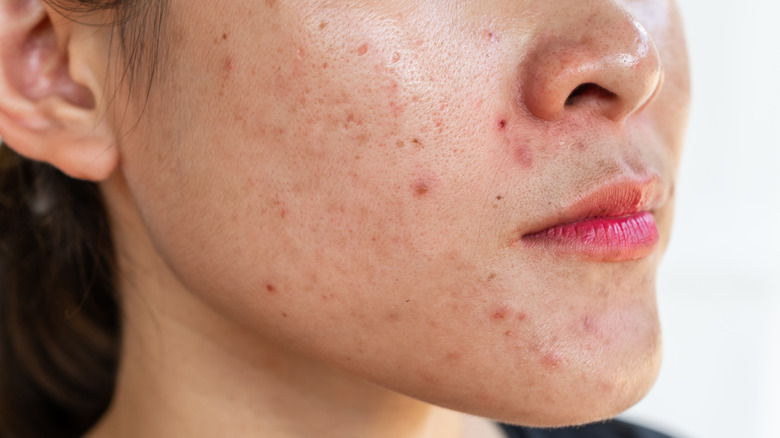How To Identify The Different Types Of Acne
Acne is an extremely common skin concern that occurs when your skin's pores become blocked by sebum, dead skin cells, and bacteria (via Mayo Clinic). Acne is most commonly found on the face, chest, and back. There are many different types of acne, and knowing the difference between each can help you treat it effectively.
Two of the most common types of acne are blackheads and whiteheads (via Cleveland Clinic). Blackheads refer to open pores that are full of oil and dead skin. When light reflects off these clogged follicles, they appear to be black. Whiteheads are clogged pores that have remained closed and have a white appearance instead of black. Papules, which are small inflamed red bumps, and pustules, which are red pimples that contain pus, are two more types of acne. Fungal acne looks similar to papules but is also often itchy. Acne can also be painful in the form of nodules and cysts. Talk to your dermatologist if you currently struggle with acne. They can help you create an effective treatment plan.
How to treat acne
Acne is treated differently depending on the type, severity, and symptoms. According to Teen Vogue, keeping your skin clean is one of the most important ways to treat many types of acne. Use a cleanser that contains breakout-fighting ingredients like salicylic acid and benzoyl peroxide. Exfoliating your face a few times a week can also help by removing dead skin cells that can clog pores, but you have to be careful not to overdo it and damage your skin. Some people also avoid moisturizing oily and acne-covered skin, but this can actually lead to more oil production and acne in the long run.
Some acne is caused by hormones, which means it needs to be treated on and underneath the skin. To fight hormonal acne internally, you'll need to make changes that will affect the hormones that cause your acne. Getting better sleep and eating a healthy diet can help regulate your hormones and fight breakouts (via Scripps). Some people also find success taking birth control to treat persistent hormonal acne.


